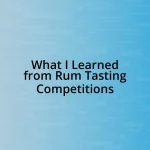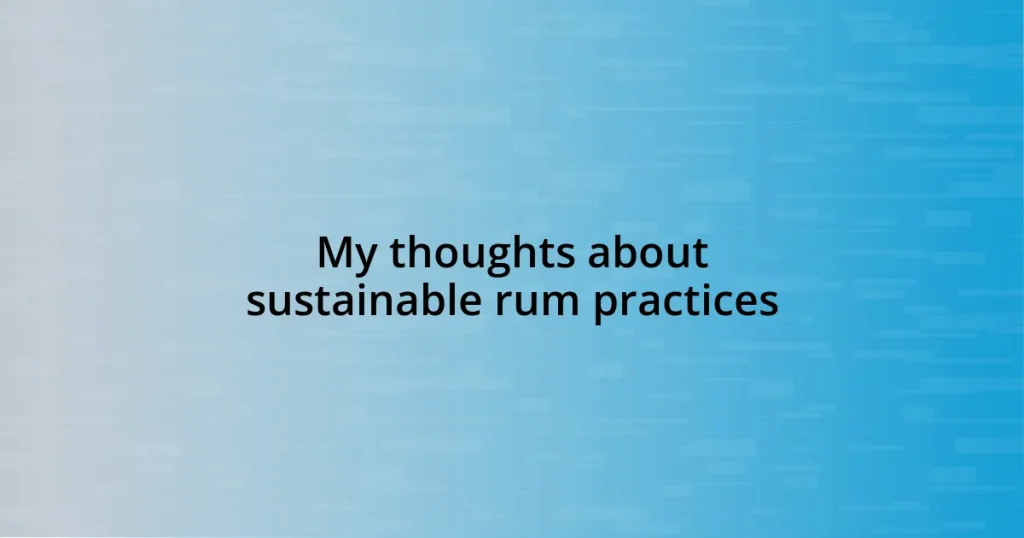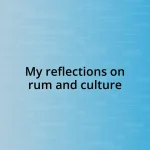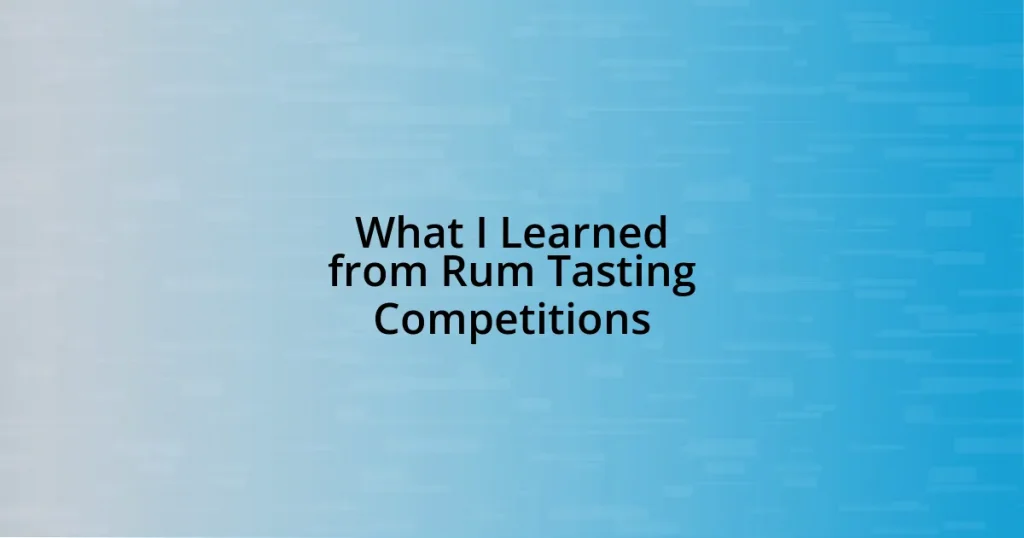Key takeaways:
- Sustainable rum practices involve organic farming, fair labor, and efficient water usage, enhancing both environmental health and community wellbeing.
- Implementing energy-efficient distillation and waste reduction techniques can significantly lower carbon emissions and resource waste in rum production.
- Choosing organic ingredients contributes to distinctive flavors and supports the livelihoods of local farmers, fostering healthier ecosystems.
- Ethical sourcing of rum ensures transparency in production, positively impacting local economies and communities through fair partnerships.
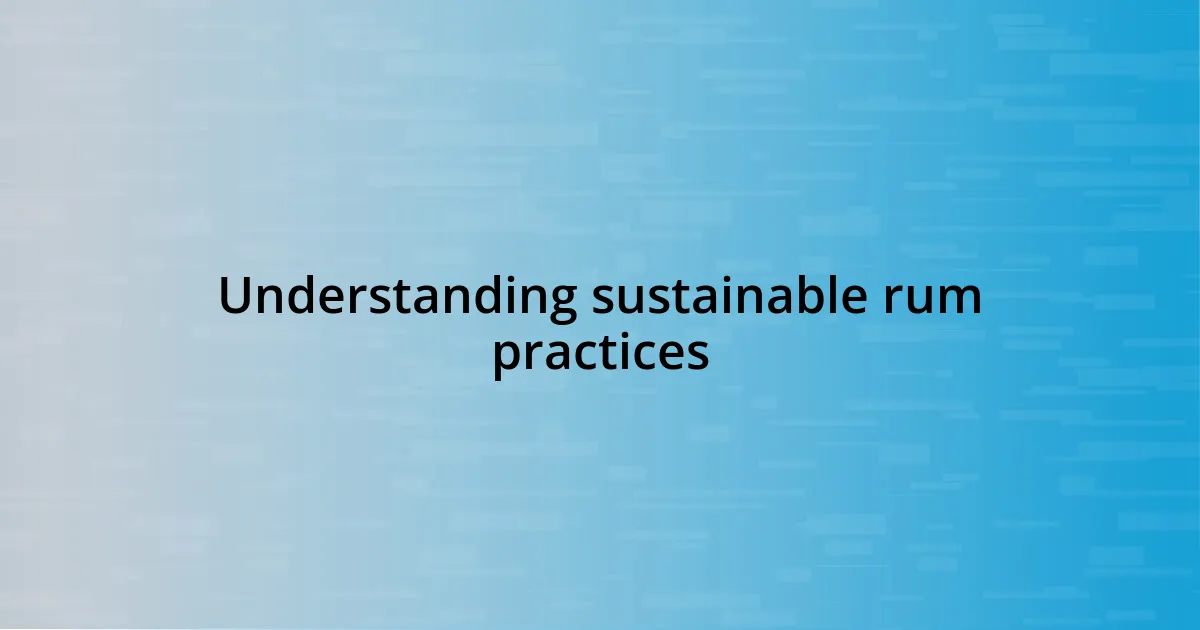
Understanding sustainable rum practices
Sustainable rum practices are about more than just the end product; they encompass the entire production cycle, from sugarcane cultivation to distillation. I remember visiting a rum distillery in the Caribbean where the owners passionately discussed their organic farming methods. It struck me how they viewed the land as a partner, emphasizing that healthy soil directly influences the quality of their rum. Doesn’t it make you wonder how our choices today will impact the flavors we experience tomorrow?
Water usage is another critical aspect of sustainability in rum production. I once learned that distilleries are rethinking their water consumption with innovative techniques like rainwater harvesting. Imagine if every distillery adopted such practices; we could significantly reduce the industry’s environmental footprint. It leads me to ponder: why not prioritize sustainability in every sip we take?
Moreover, sustainable rum also focuses on fair labor practices. I had a heartfelt conversation with a local farmer who shared how ethical practices have transformed his community. Hearing his pride in being able to provide for his family and invest in local education made me realize that sustainability is not just about the environment; it touches lives. Having this connection enhances the drinking experience, doesn’t it?
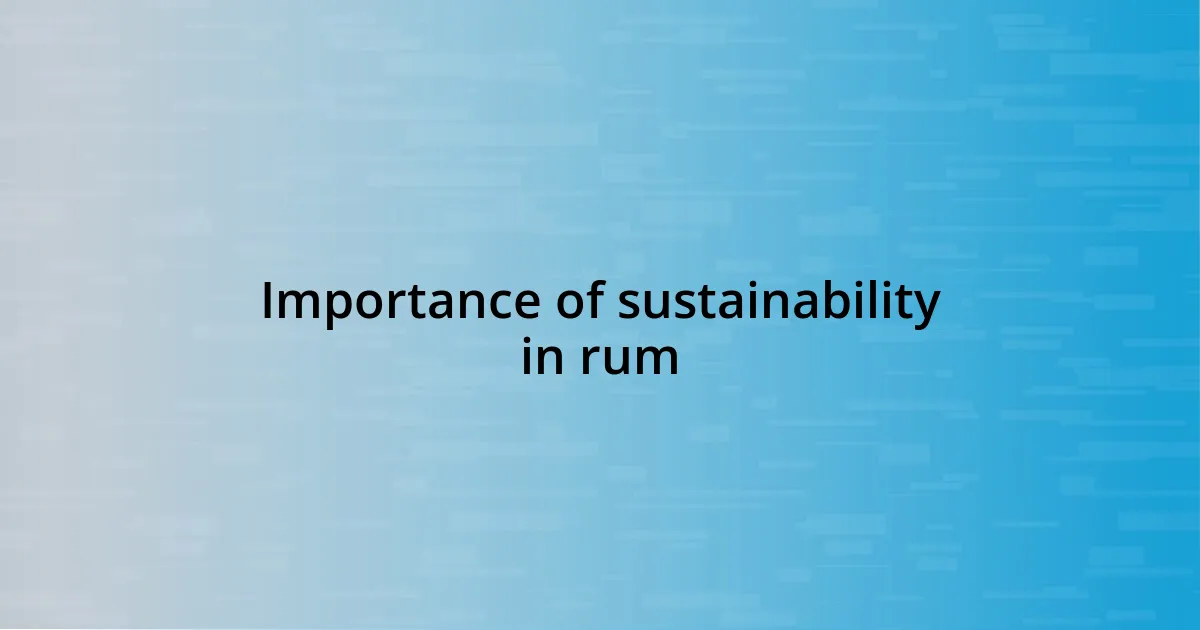
Importance of sustainability in rum
Sustainability in rum is crucial not just for the environment but also for the communities entwined with its production. I once attended a rum festival where I met a producer who adopted sustainable practices. As he shared stories of how environmentally conscious methods helped revive local wildlife while boosting crop yields, I felt a deep connection to the land and its resources. It reinforced the idea that sustainable choices lead to stronger communities, which enhances the rum’s story in each bottle.
- Sustainable rum practices help preserve biodiversity, ensuring healthy ecosystems.
- They promote soil health, a fundamental element for high-quality sugarcane.
- Fair labor practices empower local workers, improving their livelihoods and communities.
- Reducing carbon footprints through energy-efficient distillation can mitigate climate change impact.
- Sustainable water management preserves this vital resource for future generations.
When we choose sustainable rum, we’re embracing a product that embodies careful stewardship of nature and support for people. It’s not just about enjoying a drink; it’s about honoring a process that respects our planet and its inhabitants.
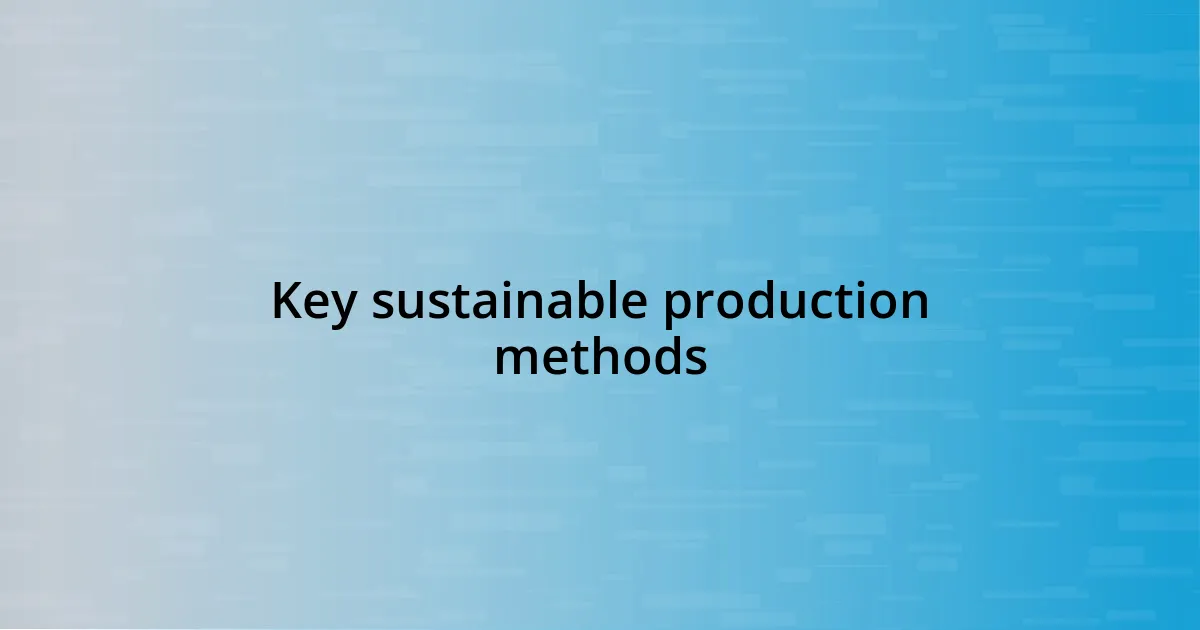
Key sustainable production methods
Sustainable production methods in rum encompass various practices that prioritize the planet and the people involved. One fascinating method is organic farming, which not only reduces reliance on harmful pesticides but also fosters a rich ecosystem. During my travels, I encountered sugarcane fields alive with diverse flora and fauna, a sign of healthier soil. Experiencing such vitality in a landscape was a reminder of the interconnectedness of our agricultural systems.
Another vital sustainable method is energy-efficient distillation. By utilizing renewable energy sources like wind or solar power, distilleries can significantly cut down on their carbon emissions. I recall chatting with a distiller who proudly shared his recent investment in solar panels. He emphasized how this shift not only lightened his environmental impact but also saved costs in the long run. Such innovations truly demonstrate that sustainable practices can harmonize economic benefits with ecological responsibility.
Finally, implementing waste reduction techniques is essential in sustainable rum production. This includes repurposing byproducts, like using leftover sugarcane bagasse as biofuel or animal feed. I remember an inspiring visit to a distillery that turned its waste into energy for their operations. Witnessing this closed-loop system made me appreciate how clever solutions can minimize waste while maximizing resource efficiency. It’s incredible to see how every step can contribute to a more sustainable future.
| Production Method | Benefits |
|---|---|
| Organic Farming | Enhances biodiversity and soil health. |
| Energy-Efficient Distillation | Reduces carbon footprint and lowers energy costs. |
| Waste Reduction Techniques | Turns byproducts into resources, lowering waste. |
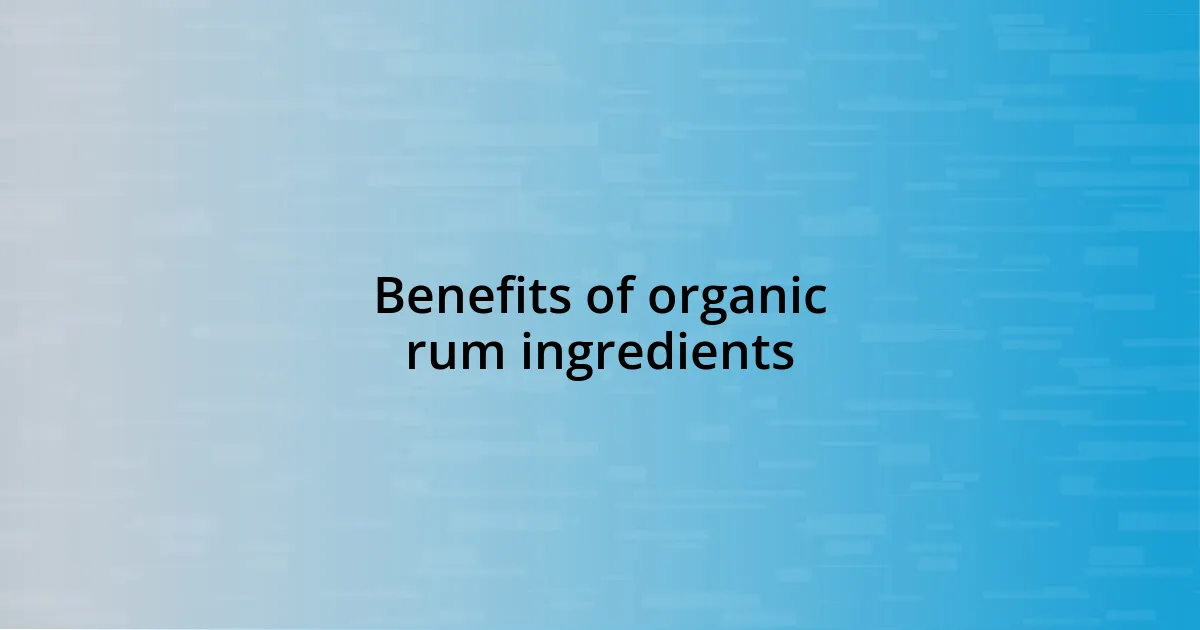
Benefits of organic rum ingredients
Organic ingredients in rum production offer a wealth of benefits that can enrich the final product and the environment alike. For instance, when I tasted a rum made from organic sugarcane, I couldn’t help but notice the depth of flavor—it was genuinely distinct. This purity comes from the absence of synthetic fertilizers and pesticides, allowing the natural terroir to shine. Isn’t it fascinating how what we consume directly reflects the practices behind its creation?
Beyond taste, organic farming fosters healthier ecosystems. I remember visiting a distillery in the Caribbean that embraced organic methods. The lush greenery surrounding the fields was teeming with butterflies, bees, and other wildlife. This vibrant scene made me appreciate how organic practices not only protect the land but also support biodiversity. It raises a poignant question: how can we argue against a method that yields life in both our spirits and our surroundings?
Moreover, using organic ingredients often means better working conditions and fairer practices for local farmers. I’ve seen firsthand how organic certification can empower communities, enabling growers to fetch higher prices for their crops. It was touching to hear a farmer express pride in his work, knowing he was nurturing both his land and family’s future sustainably. This interconnectedness makes you realize that every sip of organic rum is a toast to those dedicated to its craft—how can we not support that?
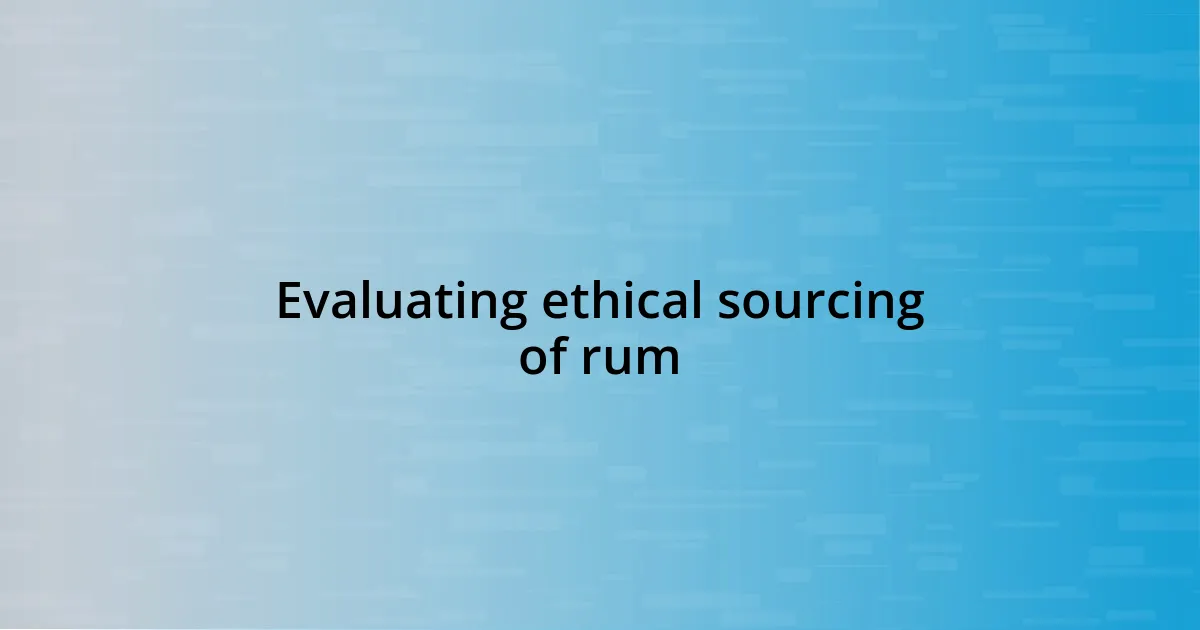
Evaluating ethical sourcing of rum
Evaluating the ethical sourcing of rum begins with understanding where the raw materials come from and how they are cultivated. I remember visiting a rum distillery in Jamaica where the owner emphasized the importance of knowing their farmers personally. This direct connection not only ensures that the sugarcane is grown sustainably but also nurtures fair labor practices. How many products can we truly say that about?
It’s vital to look at the entire supply chain, too, assessing everything from farming methods to workers’ rights. I recently came across a rum brand that publishes its sourcing practices transparently, detailing the origins of their ingredients and the conditions under which they are harvested. This openness made me feel more connected to the brand. Doesn’t it make a difference when we know exactly what we’re supporting with our purchases?
Furthermore, ethical sourcing impacts local economies significantly. In Barbados, I chatted with a local farmer who explained how ethical partnerships with distilleries have helped him invest in his community. He spoke with such pride about funding education for local children through the sales of his sugarcane. It struck me then: every bottle of ethically sourced rum isn’t just a spirit, but a story of community and sustainability. Isn’t that a powerful reason to choose wisely?
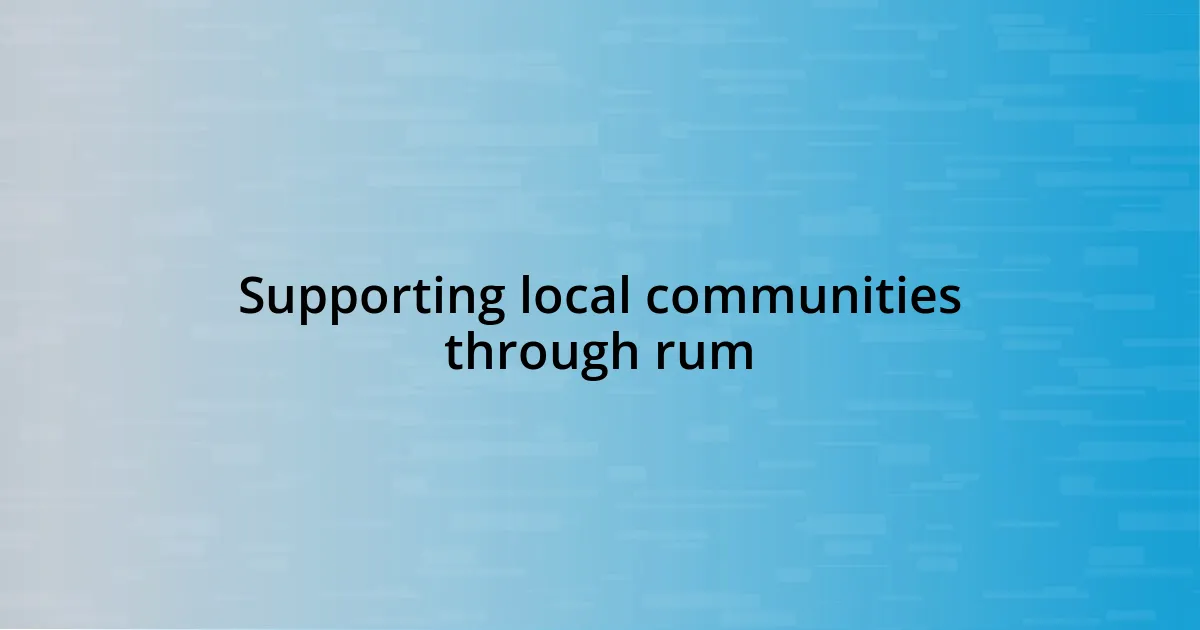
Supporting local communities through rum
When I think about supporting local communities through rum, I can’t help but recall my visit to a small distillery in Martinique. The owner shared how every bottle sold helps fund local schools and healthcare initiatives. It was heartwarming to see the direct impact of rum production on the lives of community members. Isn’t it inspiring to realize that each sip can contribute to building a brighter future for families?
There’s also something magical about the way rum production roots itself in local culture. A talented bartender I met in Puerto Rico described how the community’s traditions influence the flavors and techniques used. I found it fascinating that every drop of rum is steeped in the stories and heritage of the people who craft it. How often do we get to enjoy something that’s not just a drink but a piece of someone’s culture?
Moreover, my experiences have shown me that businesses that prioritize local sourcing can create a ripple effect of positivity. I remember a conversation with a rum producer in the Dominican Republic who told me about collaborating with neighboring farmers to establish sustainable practices. The mutual support not only improved their products but also fortified their bonds as neighbors. It makes you think—when we choose to support local rum brands, aren’t we investing in the very communities that make our spirits special?



